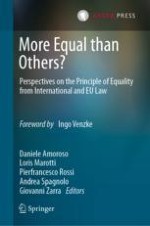2023 | OriginalPaper | Buchkapitel
14. Equality and Asymmetry in Treaty-Based Investment Arbitration: Counterclaims by Host States
Aktivieren Sie unsere intelligente Suche, um passende Fachinhalte oder Patente zu finden.
Wählen Sie Textabschnitte aus um mit Künstlicher Intelligenz passenden Patente zu finden. powered by
Markieren Sie Textabschnitte, um KI-gestützt weitere passende Inhalte zu finden. powered by
